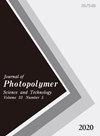PTzBT三元聚合物太阳能电池电荷积累的ESR分析
IF 0.7
4区 化学
Q4 POLYMER SCIENCE
Journal of Photopolymer Science and Technology
Pub Date : 2021-06-11
DOI:10.2494/photopolymer.34.351
引用次数: 2
摘要
现象,我们假设从1,2-二氧乙二酮到DNSE的能量转移在四氢呋喃和水溶液中瞬间发生,因为它们的互溶性。值得注意的是,在高极性溶剂中,DNSE的发射没有被观察到,可能是因为化学发光反应的速度太快,与使用低极性溶剂观察到的情况相比,肉眼无法检测到由溶剂与水的混溶引起的发射。此外,虽然乙酸乙酯不与水混溶,但未观察到有排放物。这可能是因为乙酸乙酯与过氧化氢的反应比二(2,4,6-三氯苯基)草酸酯的氧化快。结果,DNSE没有被激发,因为没有产生1,2-二氧乙二酮。本文章由计算机程序翻译,如有差异,请以英文原文为准。
Analyses of Charge Accumulation of PTzBT Ternary Polymer Solar Cells Using ESR Spectroscopy
phenomenon, we hypothesize that energy transfer from 1,2-dioxetanedione to DNSE occurred momentarily in the THF and water solution because of their miscibility. Note that, in highly polar solvents, the emission of DNSE was not visualized, probably because the rate of chemiluminescent reaction is too fast to visually detect the emission caused by the miscibility of their solvents with water in comparison with the case observed using low-polarity solvents. Moreover, no emission was observed with ethyl acetate, although it is immiscible with water. This is probably because the reaction of ethyl acetate with hydrogen peroxide was faster than the oxidation of bis(2,4,6-trichlorophenyl) oxalate. As a result, DNSE was not excited because 1,2-dioxetanedione was not produced.
求助全文
通过发布文献求助,成功后即可免费获取论文全文。
去求助
来源期刊
CiteScore
1.50
自引率
25.00%
发文量
0
审稿时长
4-8 weeks
期刊介绍:
Journal of Photopolymer Science and Technology is devoted to the publication of articles on the scientific progress and the technical development of photopolymers.

 求助内容:
求助内容: 应助结果提醒方式:
应助结果提醒方式:


